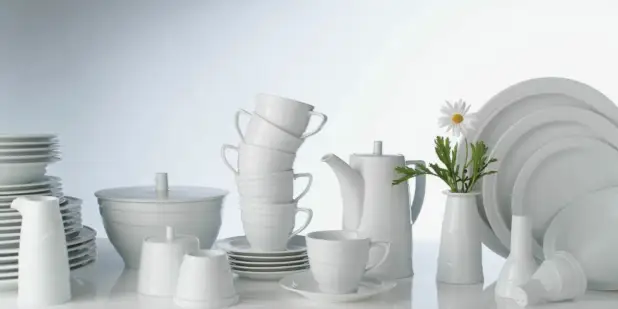An EAC certificate for tableware and kitchen utensils is a conformity declaration confirming that products fulfill the requirements of the Eurasian Economic Union (EAEU).
The EAEU includes Russia, Belarus, Kazakhstan, Armenia, and Kyrgyzstan. To legally sell tableware and kitchen utensils in these countries, it is necessary to comply with certain EAC norms and requirements, which are confirmed through the EAC certificate or the EAC declaration.
Steps to Obtain an EAC Certificate
Here are the basic steps to obtain an EAC certificate or an EAC declaration for tableware and kitchen utensils:
1. Product Analysis and Documentation: Ensure that your products comply with EAEU regulations. Collect all relevant documentation, including technical specifications, safety data sheets, and user manuals.
2. Choosing a Certification Body: Select an accredited certification provider authorized to issue EAC certificates and EAC declarations. This provider will verify your product's compliance with EAC standards.
3. Submission of Documentation: Submit all required documents to the certification body.
These may include:
- Application form
- Customs tariff number
- Technical description
- Results of product testing
- Quality management certificates
4. Product Testing and Inspection: In certain cases, products must be tested in an accredited laboratory. These tests verify compliance with the relevant EAC norms and GOST standards.
5. Conformity Assessment: The certification provider evaluates the test results and submitted documentation. If everything meets the requirements, the EAC certificate or EAC declaration will be issued.
6. Issuance of the EAC approval: After successful conformity assessment, the EAC approval is issued. This certifies that the product fulfills the requirements of the EAEU and may be distributed in the member countries.
7. EAC Marking: Once the certificate or declaration is issued, products must be marked with the EAC symbol. This symbol indicates to consumers that the product complies with legal requirements.
An EAC certificate is typically valid for a specified period and must be renewed upon expiration. It is also important to regularly stay informed about changes in the TR CU/EAEU regulations of the EAEU member states to ensure your products remain compliant with TR CU/EAEU guidelines.
Types of EAC Approvals for Tableware
There are different types of EAC approvals for tableware and kitchen accessories, depending on the type of product and the specific technical regulations of the Eurasian Economic Union.
The main types of EAC approvals include:
1. EAC Declaration: The EAC declaration is a simplified EAC conformity assessment, in which the manufacturer or importer declares the EAC conformity of the product with the technical regulations and TR CU/EAEU directives of the EAEU member states.
Scope: This type of EAC approval is often used for lower-risk products such as certain types of tableware and kitchen accessories.
Process: The manufacturer/importer submits the required documents and declares that the product complies with the standards. Product tests may be required, but do not always have to be carried out by an accredited laboratory.
2. EAC Certificate: The EAC certificate is a more formal EAC conformity assessment, in which an accredited certification authority confirms the EAC conformity of the product with the technical regulations of the EAEU member states.
Scope: This type of approval is often used for higher-risk products or products subject to specific safety and quality requirements.
Process: To obtain an EAC certificate, products must be tested in an accredited laboratory, and the certification authority conducts a thorough evaluation.
3. GOST Certificate: Before the introduction of the EAC certification system, the GOST certificate was the standard for conformity assessments in Russia and EAEU member states. It is still used for certain products and voluntary certifications.
Scope: Some types of tableware and kitchen accessories may still fall under GOST certification, especially if they have to fulfill specific requirements not covered by EAC regulations.
Process: Similar to EAC certification, product tests must be carried out in accredited laboratories, and EAC conformity must be confirmed by a certification body.
4. SGR Registration: The SGR registration confirms that the product complies with hygienic and sanitary EAC standards of the EAEU member states.
Scope: For tableware and kitchen accessories that come into direct contact with food, an SGR registration might be required.
Process: Products must be tested for hygienic and sanitary compliance, often in specialized laboratories dedicated to this type of testing.
The specific type of EAC approval depends on the classification of the product and the applicable technical regulations. It is advisable to contact a specialized service provider or certification body to determine the exact requirements for your product.
Validity Period of EAC Approvals for Tableware
The validity period of EAC approvals for tableware and kitchen accessories may vary, depending on the type of approval and the specific conditions under which they were issued.
Here are the general guidelines for the validity period of EAC approvals:
1. Validity period of EAC declarations: Usually between 1 and 5 years.
Renewal: After expiration, the EAC declaration must be renewed by the manufacturer or importer declaring EAC conformity again and, if necessary, providing new tests and documentation.
2. Validity period of EAC certificates: Usually between 1 and 5 years, depending on the type of product and the specific requirements of the TR CU/EAEU directives.
Renewal: After expiration, the EAC certificate must be renewed. Typically, this requires a new evaluation of the product by the certification authority, including new tests and verification of EAC documentation.
3. Validity period of GOST certificates: Usually 1 to 3 years.
Renewal: After expiration, the GOST certificate must be renewed by conducting new product tests and inspections.
4. Validity period of SGR registrations: Often 1 to 5 years, depending on the type of product and specific sanitary requirements.
Renewal: After expiration, the SGR registration must be renewed, often through new hygienic tests and inspections.
It is important to note that the validity period of certificates and declarations also depends on the specific requirements of the EAEU countries and the conditions set by the certification authority.
Manufacturers and importers should regularly check current regulations and requirements, ensuring their certificates and declarations are renewed in a timely manner to continue distributing their products within the EAEU.
Duration of Certification for Tableware
The duration of certification for tableware and kitchen accessories can vary depending on several factors, including the type of certification, the complexity of the product, and the efficiency of the certification process.
Here are the general steps and the estimated duration for each phase:
1. Preparation phase: Gathering the required documentation, such as technical specifications, safety data sheets, and instructions for use. The preparation phase usually takes 1 to 2 weeks.
2. Submission of documents: Submitting the required documents to the EAC certification provider. This includes filling out application forms and providing technical descriptions of the product. The submission phase usually takes 1 to 2 weeks.
3. Product testing and inspections: Conducting tests in accredited laboratories to verify the product's compliance with EAC technical regulations of the EAEU. This duration may vary depending on laboratory availability and the complexity of tests. This phase usually takes 2 to 4 weeks.
4. Conformity assessment: The certification body evaluates the test results and submitted documentation. Upon successful evaluation, the EAC certificate or EAC declaration is issued. This phase usually takes 1 to 2 weeks.
5. Issuance of the EAC certificate or EAC declaration: Official issuance of the certificate or declaration; the product can now be marked with the EAC sign and distributed in EAEU countries.
Overall, the duration of certification for tableware and kitchen accessories can range between 4 and 8 weeks, depending on the factors mentioned above.
Here are some specific factors that may influence the duration:
1. Complexity of the product: The more complex the product, the longer the testing and evaluation may take.
2. Availability of testing laboratories: If accredited laboratories are heavily booked, delays may occur.
3. Completeness and accuracy of documentation: Incomplete documentation can prolong the process, as corrections may be necessary.
4. Experience of the certification body: An experienced and efficient approval body can speed up the EAC process.
It is advisable to plan the certification process early and ensure all required documents and information are complete and accurate to minimize delays.
Costs of EAC Certification for Tableware
The costs of EAC certification for tableware and kitchen accessories can vary significantly depending on various factors.
Here are the main cost factors and a general estimation of the possible costs:
1. Costs of EAC declaration: Usually less expensive than EAC certification. Costs can range between 1,200 and 2,000 euros.
2. Costs of EAC certification: More expensive than the declaration costs due to more extensive testing. Costs can range between 2,000 and 7,000 euros.
3. Product tests: Costs for product testing in accredited laboratories vary depending on the type and number of required tests. These costs can amount to between 1,500 and 3,000 euros.
4. Certification Body: Fees for services of the certification center. These fees can range between 1,000 and 3,000 euros, depending on the complexity of the certification process.
5. Documentation and translations: Costs for preparing and translating the required technical documentation. This can cost between 1,000 and 3,000 euros, depending on the scope of documentation and specific requirements.
Total costs: Considering the above factors, the total costs for EAC certification for tableware and kitchen accessories can be estimated as follows:
- EAC Declaration: between 1,200 and 5,000 Euro
- EAC Certificate: between 4,000 and 10,000 Euro
It is important to note that these estimations can vary and depend on the specific requirements of the product and the selected service providers.
Legal Situation of EAC Certification for Tableware
The legal situation regarding EAC certification for tableware and kitchen accessories is clearly defined and regulated by the technical regulations of the Eurasian Economic Union (EAEU).
Responsibilities and obligations:
1. Manufacturers
- Must ensure that their products comply with the technical regulations
- Are responsible for conducting the necessary tests and inspections
- Must prepare and retain EAC conformity documentation
2. Importers
- Must ensure that imported products comply with requirements and possess the necessary certificates or declarations.
- Carry responsibility for marking products with the EAC conformity mark of the EAEU member states.
3. Certification Bodies
- Are accredited to carry out EAC conformity assessments and issue the corresponding certificates or declarations.
- Must ensure that their testing procedures comply with legal requirements and TR CU/EAEU guidelines.
Consequences of Non-Compliance:
Penalties: Products placed on the market without valid certification and marking may be withdrawn from circulation. Fines and other legal measures may be imposed on manufacturers and importers.
Product Liability: In the event of defects or safety issues, manufacturers and importers are liable for damages caused by non-compliant products.
Summary: EAC certification is a legal requirement for distributing tableware and kitchen accessories in the EAEU member states. It ensures that products meet applicable safety and quality requirements.
Manufacturers and importers are responsible for performing the EAC conformity assessment and ensuring that their products are correctly marked. Non-compliance can lead to significant legal and financial consequences.


